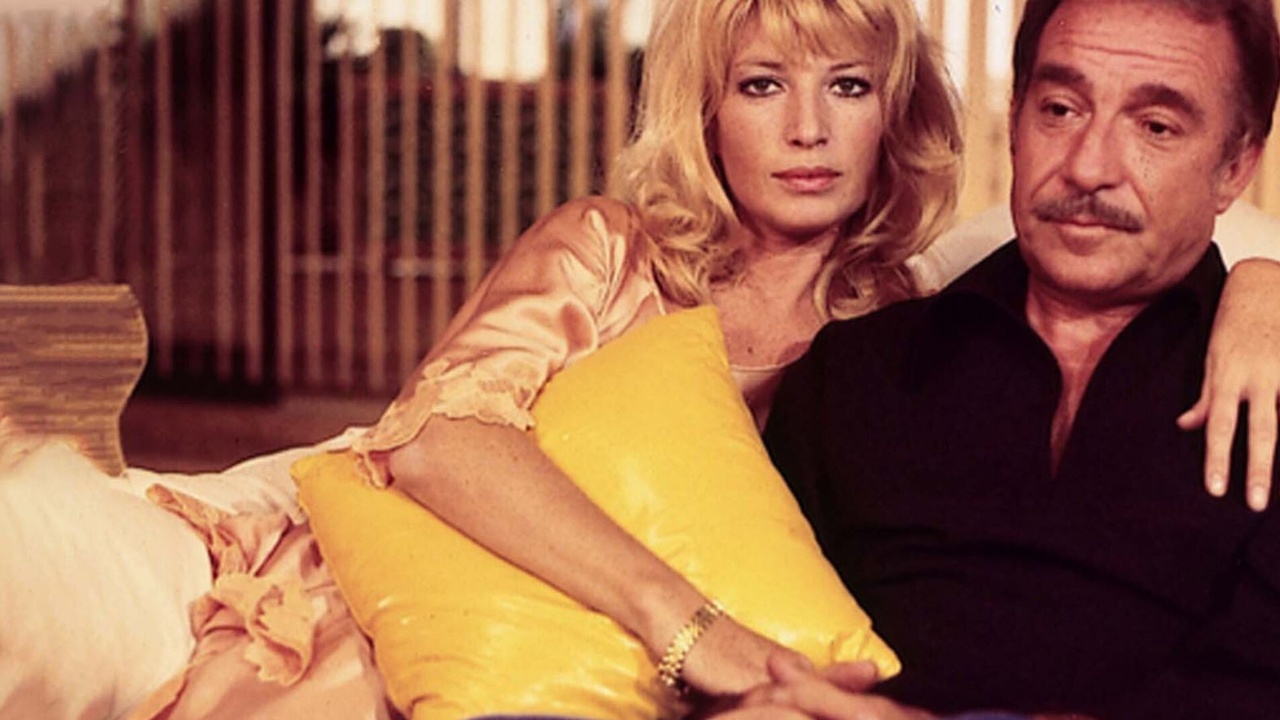postphx.com – “Duck in Orange Sauce” (original title: “L’anatra all’arancia”), directed by Luciano Salce, is a 1975 Italian comedy that captures the sophisticated and often absurd dynamics of love, jealousy, and marital gamesmanship. Based on a French play by William Douglas-Home and Marc-Gilbert Sauvajon, the film mixes farce with witty dialogue, making it a delightful romp through the romantic entanglements of the upper class. With memorable performances by Monica Vitti, Ugo Tognazzi, and Barbara Bouchet, this film remains a quintessential example of Italian comedy during the 1970s.
Plot Overview
The story centers on Livio Stefani (Ugo Tognazzi), a charming yet philandering businessman, and his glamorous wife, Lisa (Monica Vitti), whose marriage has hit a rocky patch. Livio suspects that Lisa has fallen for a handsome Frenchman named Jean-Claude (John Richardson) and plots to win her back by using jealousy as a weapon.
Instead of confronting her, Livio invites Jean-Claude to their villa for a weekend getaway, where he also brings his young and seductive mistress, Patrizia (Barbara Bouchet). What follows is a comedic battle of wits and seduction, as Livio tries to outdo his rival while maintaining a façade of nonchalance. The film is filled with witty repartee, misunderstandings, and carefully planned schemes, as each character tries to get the upper hand in the complicated love quadrangle.
Comedy of Marital Games
“Duck in Orange Sauce” is a classic comedy of manners, centered around the games people play in love and marriage. The characters engage in a series of manipulations, flirtations, and deceptions, but it’s all done with a light, playful touch. At its heart, the film explores the idea of rekindling passion in a marriage that has lost its spark. Instead of dealing with their issues directly, Livio and Lisa use jealousy and romantic competition as tools to reignite the flames.
The film’s title, “Duck in Orange Sauce,” becomes a metaphor for this idea of presenting something familiar in a new and enticing way. Just as the traditional dish is given a sweet, zesty twist, the couple’s relationship is spiced up by the introduction of jealousy and playful rivalry.
Performances: Ugo Tognazzi and Monica Vitti Shine
The success of the film largely rests on the comedic talents of Ugo Tognazzi and Monica Vitti, two of Italy’s most beloved actors. Tognazzi, with his impeccable timing and ability to balance suave charm with bumbling frustration, delivers a standout performance as Livio. His character’s attempts to outwit Jean-Claude and win back his wife without openly acknowledging his own insecurities provide much of the film’s humor.
Monica Vitti, known for her work in both serious dramas and comedies, brings depth and wit to Lisa. While Lisa appears cool and collected, Vitti expertly conveys the nuances of a woman who is tired of her husband’s infidelities yet intrigued by his sudden determination to win her back. Vitti and Tognazzi have palpable chemistry, making their banter and romantic tension both believable and entertaining.
Barbara Bouchet and John Richardson round out the cast, playing the respective rivals with equal parts charm and allure. Bouchet’s portrayal of the seductive Patrizia adds a layer of comedic tension, as her presence further complicates the already delicate situation.
A Stylish Comedy of the 1970s
“Duck in Orange Sauce” is a film that perfectly encapsulates the stylish and breezy tone of 1970s Italian cinema. The setting—a luxurious villa—provides a picturesque backdrop for the farcical events, and the characters’ fashionable clothing and lifestyle reflect the affluent, cosmopolitan world they inhabit.
The film’s visual style, combined with its sharp dialogue, creates a sophisticated atmosphere reminiscent of the elegant comedies of earlier decades, while also incorporating the more liberated attitudes toward love and relationships that were becoming prevalent in the 1970s.
The direction by Luciano Salce, who had a talent for balancing humor with sophistication, ensures that the film remains lighthearted and fast-paced, even as the characters’ schemes become more elaborate. The witty script, coupled with clever sight gags and physical comedy, keeps the audience engaged, while the romantic tension adds an emotional layer to the humor.
Themes: Love, Jealousy, and Renewal
At its core, “Duck in Orange Sauce” is a film about the complexities of love and the lengths people will go to maintain or reignite passion in their relationships. Livio’s jealousy, despite his own infidelities, highlights the fragile ego that often accompanies romantic love. Meanwhile, Lisa’s flirtation with Jean-Claude serves as both a test of her marriage and a means of asserting her own independence in a relationship where she feels taken for granted.
The film also touches on the idea of renewal in love—how even long-term relationships require a fresh perspective and effort to remain vibrant. Livio’s elaborate scheme to make his wife jealous, while rooted in manipulation, ultimately leads to a deeper understanding between the two, suggesting that sometimes even the most dysfunctional tactics can bring a couple closer.
Legacy and Reception
While “Duck in Orange Sauce” may not be as internationally renowned as other Italian comedies from the 1970s, it has gained a loyal following over the years, particularly among fans of Ugo Tognazzi and Monica Vitti. The film’s blend of sophisticated humor, romantic intrigue, and lighthearted farce makes it a timeless piece of entertainment.
Today, it is appreciated not only for its witty take on love and marriage but also as a snapshot of Italian cinema during a period when filmmakers were exploring more liberated and modern themes in relationships. The film’s playful take on jealousy, seduction, and reconciliation continues to resonate with audiences, making “Duck in Orange Sauce” a charming and enduring example of Italian comedic cinema.
